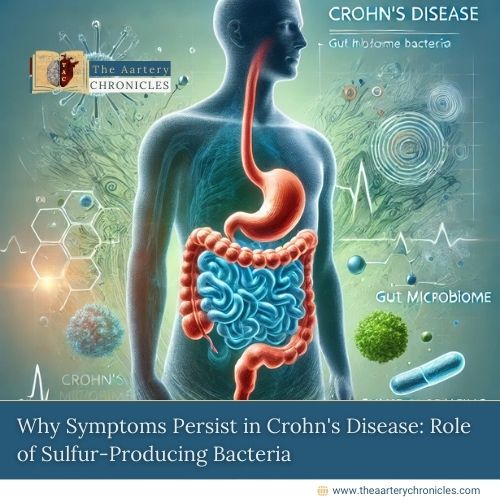

Why Symptoms Persist in Crohn's Disease: Role of Sulfur-Producing Bacteria
Why Do Symptoms Persist Despite Inflammation Being Absent?
A study from researchers at the University of Michigan sheds light on a puzzling issue for Crohn’s disease patients. Many individuals continue to experience symptoms even when inflammation—the hallmark of active disease—is absent.
Their findings, published in Inflammatory Bowel Disease under the title “Why Symptoms Linger in Quiescent Crohn’s Disease: Investigating the Impact of Sulfidogenic Microbes and Sulfur Metabolic Pathways,” delve into the potential role of sulfur-metabolizing bacteria in the gut.
Persistent Symptoms in Quiescent Crohn’s Disease
For nearly one-third of patients with quiescent inflammatory bowel disease (IBD), symptoms persist despite the absence of inflammation. This issue is particularly prevalent in Crohn’s disease, where the symptom burden significantly impacts patients’ quality of life.
A previous study by the same research team explored the microbiomes of Crohn’s disease patients in remission but with ongoing symptoms. They found an enrichment of sulfur-producing bacteria in these patients’ guts compared to those without symptoms
The Role of Sulfur-Producing Bacteria
The latest study reinforces the connection between persistent symptoms and sulfidogenic microbes. Stool samples from patients with quiescent Crohn’s disease and lingering symptoms revealed an abundance of sulfur-metabolizing bacteria and related metabolic pathways.
“This finding was intriguing because it aligned with our earlier research,” said Dr. Allen Lee, assistant professor of internal medicine at the University of Michigan and co-senior author of the study.
Hydrogen sulfide, a byproduct of these bacteria, appears to play a disruptive role. It can compromise intestinal permeability, weakening the gut barrier’s ability to keep toxins out while allowing nutrients in. This condition, often referred to as “leaky gut,” may also increase visceral hypersensitivity, exacerbating symptoms.
Looking Beyond Inflammation
Initially, researchers hypothesized that subclinical inflammation—too subtle to detect—might explain the symptoms. However, their findings showed that symptoms persisted in patients regardless of whether their disease was in deep remission. This prompted a closer examination of the gut microbiome for alternative explanations.
By analyzing stool samples from 39 symptomatic and 274 asymptomatic patients with quiescent Crohn’s disease, the team discovered significant differences in the fecal metabolome, further implicating sulfur-producing bacteria.
A Quality-of-Life Challenge
Persistent symptoms in quiescent Crohn’s disease pose a major challenge for treatment. While inflammation remission is often the primary goal, unresolved symptoms continue to burden patients, leading to higher medical costs and an increased risk of opioid use.
Dr Lee noted, “The symptom burden in our patients with quiescent Crohn’s disease was comparable to those with active disease. This significantly affects their quality of life.”
Next Steps: Exploring Dietary Interventions
Future research will focus on validating these findings through independent cohort studies. Additionally, the team has launched a pilot study to explore the impact of a low-sulfur diet on patients with persistent symptoms.
By understanding the role of sulfidogenic microbes, researchers hope to pave the way for novel therapeutic approaches that address this overlooked aspect of Crohn’s disease management.
Source: Inputs from various media Sources
I’m a pharmacist with a strong background in health sciences. I hold a BSc from Delhi University and a pharmacy degree from PDM University. I write articles and daily health news while interviewing doctors to bring you the latest insights. In my free time, you’ll find me at the gym or lost in a sci-fi novel.









